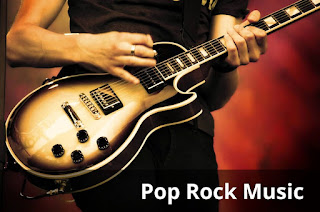Pop rock (also set as pop/rock ) is rock music with a greater emphasis on professional songwriting and recording, and less emphasis on attitude. Originating in the 1950s as an alternative to rock and roll, early pop rock was influenced by the beat, setting, and rock and roll style (and sometimes doo-wop). This can be seen as a different genre field, rather than music that overlaps with pop and rock. Pop rock critics often deride it as a slick, less authentic commercial product of rock music.
Video Pop rock
Characteristics and etymology
A lot of pop and rock music are very similar in terms of sound, instrumentation and even lyrical content. The terms "pop rock" and "power pop" have been used to describe a more commercially successful music that uses elements of, or a form of rock music. Writer Johan Fornas views pop/rock as "a single continuous field of genre", rather than a different category. For writers Larry Starr and Christopher Waterman, it is defined as "a variety of upbeat rock music" represented by artists and bands such as: Andy Kim, the Bells, Paul McCartney, Lighthouse, and Peter Frampton.
The term pop has been used since the early 20th century to refer to popular music in general, but since the mid-1950s it began to be used for different genres, aimed at the youth market, often characterized as an alternative which is softer for rock and roll. In the aftermath of the British Invasion, from about 1967, it was increasingly used in opposition to long rock music, to describe a more commercial, temporary and accessible form.
In 2010, pop rock guitar and indie rock are terms that are synonymously used in contrast to non-guitar pop music such as hip hop and R & B.
Maps Pop rock
Debate
Critics Philip Auslander argues that the difference between pop and rock is more prominent in the US than in Britain. He claims in the US, pop has roots in white crooners like Perry Como, while rock is rooted in African-American music that is influenced by forms such as rock and roll. Auslander points out that the concept of pop rock, which blends pop and rock in opposition to the typical conception of pop and rock as opposed to. Auslander and several other scholars such as Simon Frith and Grossberg argue that pop music is often described as a form of entertainment that is not authentic, cynical, "commercial slick", and formulation. Instead, rock music is often heralded as an authentic, sincere, and anti-commercial musical form, which emphasizes songwriting by singers and bands, instrumental skills, and "real relationship with the audience".
Simon Frith's analysis of the history of popular music from the 1950s to the 1980s has been criticized by BJ Moore-Gilbert, who argues that Frith and other scholars have overemphasized the role of "rock" in the history of popular music by calling each new genre using the suffix "rock ". So when the folk-oriented music style developed in the 1960s, Frith called it "folk rock", and the pop-infused style of the 1970s was called "pop rock." Moore-Gilbert claims that this approach unfairly places the rock at the peak, and makes every other influence the centerpiece of the rock center.
See also
Other guitar-based pop genres
References
Source of the article : Wikipedia

